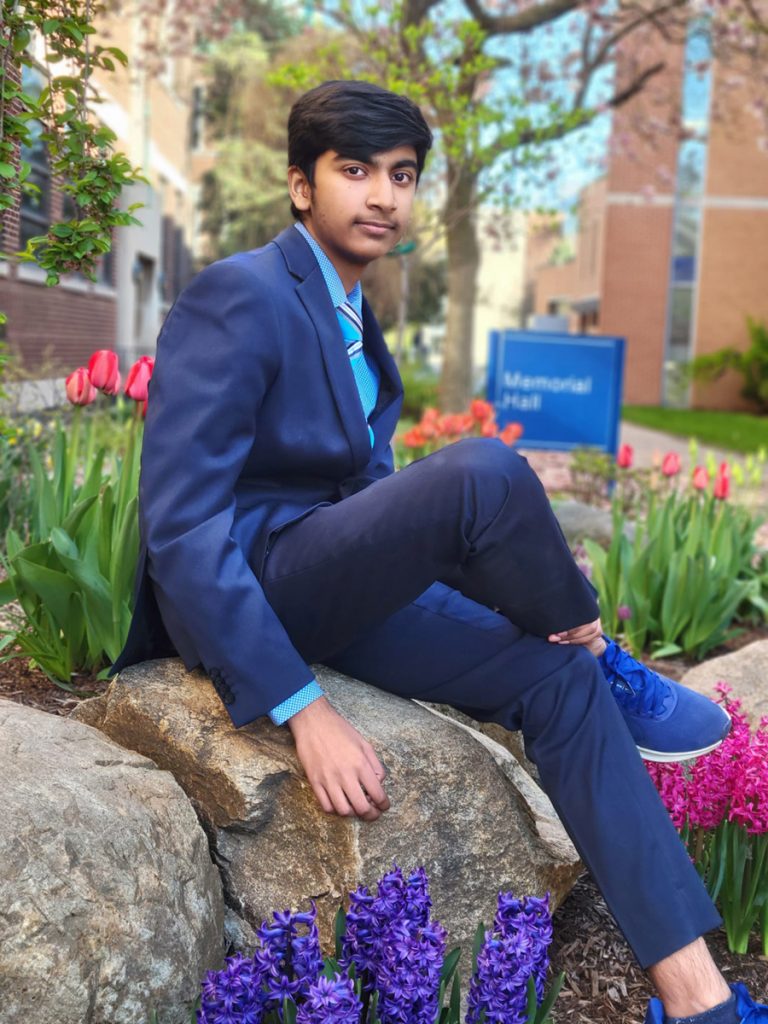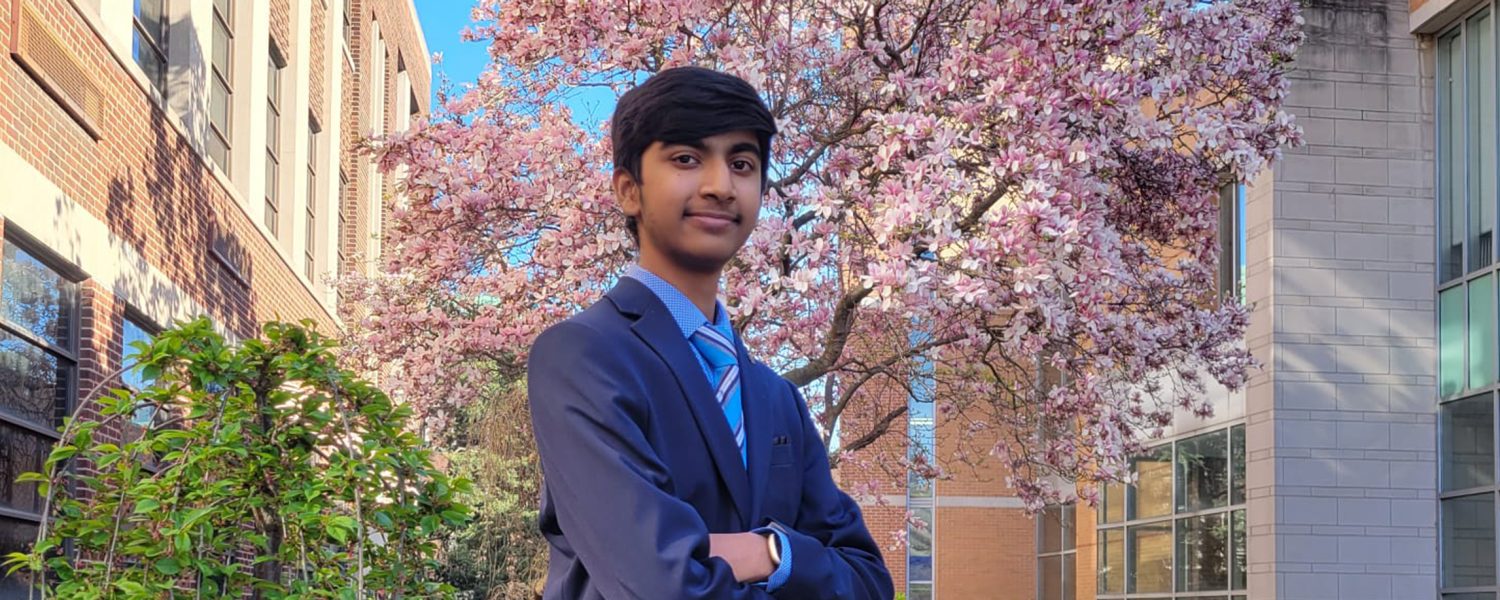Tesko Chaganti on His Research and Work-life
Balance as an Award Winning Teenage Scientist
Story by Ryan Percy
Photography Subba Rao Chaganti
It is a lot of effort to dedicate yourself to hours of research. To take an idea, a hope, a dream, and put in the time to see if what you think might be true, really is. Now imagine not being a scientist, not actually having any funding. Sounds difficult? Now do you think you would have been able to do all of that when you were a freshman in high school?
Meet Tesko Chaganti, who made waves during his Grade 9 year at Vincent Massey by running thousands of simulations to come to discoveries that may eventually lead to longer, healthier lives for everyone on the planet.
“I used to watch sci-fi videos as a kid,” Tesko says with a laugh at how he first got interested in doing this research, “There’s a channel on YouTube, Kurzgesagt, and they were talking about senescent cells and stem cells and I was like ‘whoa, what is this stuff?’ and started researching it.”
The videos Tesko watched, called Why Age? Should We End Aging Forever? and How to Cure Aging – During Your Lifetime?, have been viewed nearly 16 million times combined.
“It was really, really cool,” Tesko says about getting into researching senescent cells, “The cells were linked to aging and I wanted to know if they were bad, can I get rid of them? Is it good for you? That was the spark.”
While Tesko is making headlines for his grade 9 science fair project that brought him all the way to the national stage, it was not the start of his interest in this aspect of research.
“The real beginning was in grade six,” Tesko says, sitting back on his chair surrounded by computers that help him do his research, “My topic was ‘Healthy in your Hundreds’ and what I explored was pretty basic. I was looking at how aging works and the main drivers behind it.”
During his grade six research he discovered the concept of senescent cells which eventually became the main focus of his research going forward.
Senescent cells are ones that have stopped dividing and eventually cause cells around them to do the same. This slowdown of cell replenishment leads to a buildup of more and more senescent cells as you age. The United States National Institute on Aging says the buildup of senescent cells ‘can affect a person’s ability to withstand stress or illness; recuperate from injuries; and learn new things, since senescent cells in the brain can degrade cognitive functions.’

“It’s essentially like a zombie,” Tesko explains how senescent cells are a root cause of aging in our bodies, “What it does is it irritates nearby cells and urges them to become a zombie also. Then altogether they release a phenotype into the local environment of your body that can cause cancer, arthritis and a bunch of other diseases.”
It is a heavy topic and with such mountains of information to sift through, but Tesko thankfully has at least one sturdy pillar to fall back on, his father and microbiologist, Subba Rao Chaganti.
“Most kids when they’re little want to be like their parents,” Tesko says with a smile about how his dad helped him get into science. “When I was a kid I was like ‘I want to be a microbiologist’ cause I saw how cool the stuff my dad was doing was. That got me on the science path and he helped me a lot.”
While many people might imagine Tesko spending long hours in a lab, goggles on, pouring chemicals in petri dishes to run his experiments but with the Pandemic raging between his Grade Six and Grade 9 years, his experimentation led him elsewhere.
“The problem during the Pandemic was if I wanted to do anything in a lab, I couldn’t,” Tesko says. “I went from physical analysis to computer simulations. But this meant I went from testing five or six things to testing a whole database of compounds and almost certainly getting a hit.”
But with all the work he has put into it so far, Tesko still aspires to push his research further.
“I went from ‘Healthy in Your Hundreds’ to ‘Unravelling the Secrets of Healthy Aging’,” Tesko says about moving forward, “In the future I’ll be doing actual lab work and testing these compounds in real life to see if they actually inhibit the proteins. From there we’d move from a simple enzymatic level study to cellular then animal studies and finally, if it gets that far, human trials.”
But with all this work Tesko is still a fourteen-year-old boy. While his passion is science and research, he still knows to keep a balance of high-level research and still maintain the life of a teenage boy, especially during the summer.
“I haven’t really been doing anything other than getting like one or two files ready,” Tesko says, finding that sweet spot of research and relaxation during his vacation, “I’ve just been playing outside with my friends, going for walks, biking, playing video games, that kind of stuff.”
Tesko’s passion has not dwindled over the summer months, there just became time to focus on keeping a balanced life. A happy life means less burn out.
But while you might be imagining him on a trajectory to working in the pharmaceutical industry, he has his mind set elsewhere.
“I actually want to become an immunologist,” he smiles as he talks about his goals, “I want to pursue a bachelor’s degree and head into medical school.”
With the amount of work he’s done already, Tesko has learned a thing or two about how to properly get into the research field and says if anyone wanted to do what he did there are some simple steps to improve your chances.
“Find a really good mentor, someone really engaged in the field and know what you’re trying to do but also have a passion for research,” Tesko says of how to make headway in life. “What you want to do is share yourself with people who are going to support you and run with you until the finish line.”




Add comment